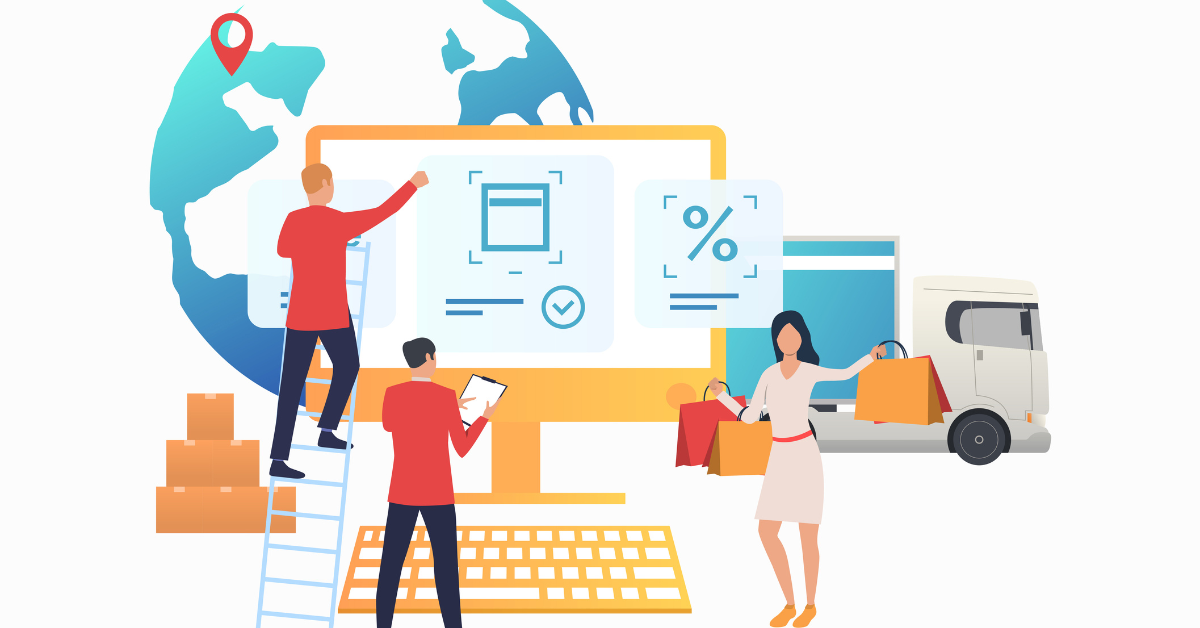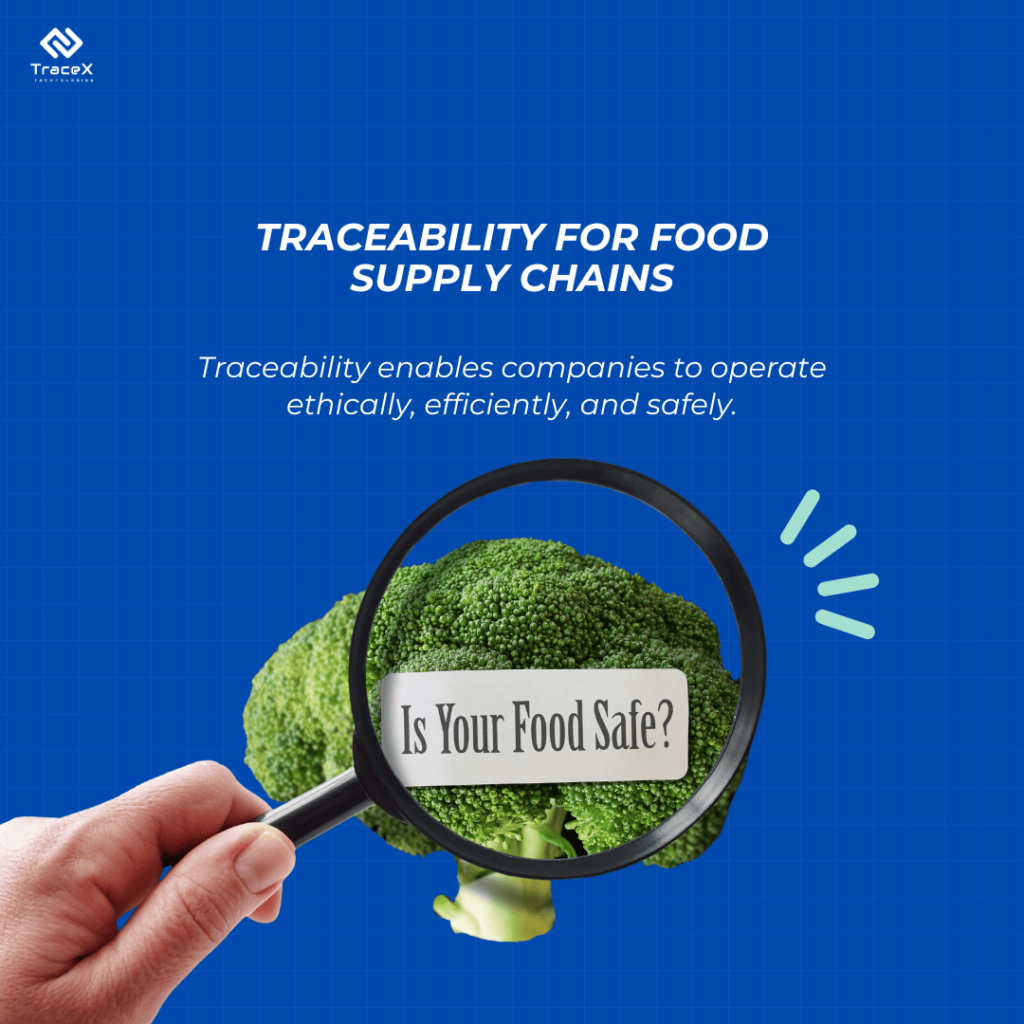Contact: +91 99725 24322 |
Menu
Menu
Quick summary: Discover 5 food supply chain traceability examples that highlight the importance of transparency in ensuring food safety, sustainability, and ethical sourcing. Learn how blockchain is revolutionizing the industry.

In today’s world, consumers are more conscious than ever about what’s on their plates. But with complex, global food supply chains, transparency is often a huge challenge. The lack of clear traceability can lead to issues like food fraud, contamination, and unsustainable sourcing practices. Food supply chain traceability has become essential for building trust and ensuring food safety.
According to Nielsen, Product ingredients now play a starring role alongside quality and value as the three most important consumer purchase considerations
Let’s dive into 5 real-world examples where innovative traceability solutions are making a big difference, helping businesses and consumers alike ensure that their food is safe, ethically sourced, and fully traceable.
Key Takeaways
Global food supply chains are fascinatingly complex networks that stretch across countries and continents, involving multiple steps before food reaches our plates. Imagine your morning coffee: the beans might have been grown in Brazil, processed in Germany, and finally brewed in your local café. This journey involves farmers, processors, distributors, retailers, and often several intermediaries.
The complexity arises from the fact that food isn’t always grown or produced close to where it’s consumed. For example, tropical fruits like bananas are often shipped from South America to Europe, while grains like wheat might be exported from the U.S. to various parts of Asia. Along the way, the food passes through a series of checkpoints—farms, factories, warehouses, ports, and grocery stores—each adding a layer to the supply chain.
One of the biggest challenges of a global food supply chain is ensuring traceability—knowing where the food comes from, how it was produced, and how it was handled. Without clear visibility, issues like food contamination, fraud, and unethical sourcing can easily go unnoticed. A batch of tomatoes that’s been contaminated, for instance, could take days to trace back to its source if there’s no proper system in place.
Sustainability is another concern. With food traveling long distances, there are environmental costs—carbon emissions from transportation, deforestation for agricultural land, and the depletion of natural resources. This is why more companies are now looking for ways to make their supply chains more transparent and sustainable, using technologies like blockchain to track every step and ensure responsible practices.
In short, global food supply chains connect us to far-off places, but they also present challenges in terms of transparency, safety, and sustainability.
Food Traceability plays a vital role in solving many of the challenges presented by global food supply chains. It provides a clear line of sight from the origin of a product to the end consumer, allowing companies and customers to know exactly where their food comes from, how it was produced, and how it was handled along the way.
Traceability is a game-changer for food safety. In traditional supply chains, tracing the source of contamination can take days, if not weeks, leading to widespread recalls and consumer health risks. With a robust traceability system, companies can pinpoint the exact source of an issue in minutes, allowing for quicker recalls and reducing the chance of tainted food reaching the public.
Transitioning from paper-based records to digital traceability systems is the first step towards improving visibility in the food supply chain. Digital tools allow for easier and more accurate record-keeping, ensuring that all critical data is captured at every stage of the process. By using digital systems, companies can instantly access vital information, reducing the time needed to respond to issues like recalls or audits.
Blockchain offers complete, real-time transparency at every stage of the supply chain. Each stakeholder can see exactly where a product is at any given time, from the moment it’s harvested to when it reaches the consumer. This level of visibility helps businesses quickly identify and resolve issues like contamination or shipping delays and gives consumers confidence in the products they’re purchasing.
Unlocking the Power of Traceability for Exports
Ever wondered about the journey your food takes before it reaches your plate? Enter food traceability platform from TraceX, the game-changer in food traceability through blockchain technology. Imagine being able to trace your favorite Basmati rice back to the very field it was grown in, ensuring not just quality but also safety and authenticity.
In collaboration with major partners and thousands of dedicated farmers in Haryana, the platform revolutionized Basmati rice production. We tackled challenges head-on, from stakeholder mismanagement to residual levels woes, all while championing sustainability.
The result? Empowered farmers brimming with trust and confidence, reaping the rewards of their hard work. And for consumers, it’s a newfound ability to track operations and make informed choices about the food they love. The future of food traceability is not just promising – it’s already here.
Revolutionizing Procurement Workflows in Agri Value Chains
A tobacco giant leveraged the innovative solutions offered by Farm management platform from TraceX for their procurement workflows with the farmers.
Firstly, the farmers undergo seamless KYC verification, establishing a foundation of transparency and trust between all parties involved. Following this, agreements are effortlessly created and approved, ensuring clarity and alignment on terms and conditions.
Next comes the crucial step of adding farm plots and crops, made simple and efficient thanks to the platform’s user-friendly interface. Moreover, the creation of tokens represents a significant milestone, symbolizing the collaborative effort and commitment to quality upheld by both the tobacco giant and the farmers, all securely recorded on the blockchain.
Throughout the procurement process, platform ensures meticulous attention to detail and traceability. From the implementation of the Dynamic QR Code (DQR) system, meticulously batched for each bale of tobacco, to streamlined grading, pricing, and weighment processes facilitated by Bluetooth technology.
As the final touch, it facilitates the generation of grade labels and LPVs, signifying not only the quality of the tobacco but also the partnership between the tobacco giant and its farmers.
This collaboration marks a significant stride towards the future of procurement in agri value chains
Revolutionizing Ethical Sourcing
A spice processing company used the TraceX Sustainability Platform to uphold ethical practices, ensuring the authenticity of their products from farm to packaging. The platform facilitated sustainability assessments, including biodiversity and water use evaluations, which aligned with ethical sourcing standards. These assessments helped the company meet compliance requirements and promote environmentally and socially responsible practices across its operations. The comprehensive traceability and monitoring system empowered the processor to build trust and ensure ethical production at every stage.
Revolutionizing authenticity of GI Tagging
Imagine the lush plantations of Kerala, where the Nendran banana reigns supreme. For the Vegetable and Fruit Promotion Council of Kerala (VFPCK), ensuring the authenticity and quality of their prized bananas for export to the United Kingdom was paramount. That’s where TraceX stepped in.
VFPCK approached TraceX with a mission: to completely digitalize their Nendran banana supply chain while providing irrefutable proof of origin and quality. With the UK’s stringent regulatory standards in mind, TraceX got to work.
Using their innovative application, TraceX seamlessly connected multiple stakeholders involved in the banana journey. From crop cultivation activities to the meticulous processes of harvesting, cleaning, sorting, grading, and packing, every detail was electronically captured and conveyed.
But the real magic happened at the consumer end. Thanks to TraceX’s QR code system, consumers could trace the journey of their bananas from Kerala’s fertile soil to their supermarket shelves in the UK. With a simple scan, they accessed vital information like product origin, dates, grade, and supply chain touchpoints, instilling trust and confidence in the authenticity and quality of the bananas they were purchasing.
By leveraging TraceX solutions, VFPCK not only ensured compliance with regulatory standards but also unlocked a new level of transparency and trust in the global marketplace. With GI tagging and TraceX technology, the journey of Nendran bananas from Kerala to the world became more than just a sales pitch – it became a testament to the power of traceability and authenticity in modern supply chains.
Read the Nendran banana journey
Revolutionizing Seed Authentication and Farmer Protection
In the heart of India’s agricultural hub, Telangana, farmers face a persistent threat – spurious seeds infiltrating the market, jeopardizing their livelihoods and crop yields. But the Government of Telangana wasn’t about to let counterfeiters win. They initiated a groundbreaking pilot project, in collaboration with TraceX, a leading blockchain solutions provider, to combat fraud and counterfeit in the spurious seed market.
This pioneering project aimed at tracing the movement of authentic, truthfully labeled seeds using blockchain technology. From seed production to the final farmer, TraceX and the Telangana government established a secure and transparent system that revolutionized the seed sector.
With TraceX’s cutting-edge blockchain solutions, tracking cotton and paddy seeds from source to final products became a reality. The system ensured the production of quality seeds while swiftly identifying counterfeits. By verifying key attributes such as origin, purity, physical and genetic traits, and germination percentage, buyers could confidently authenticate seed quality, safeguarding their investments and crop yields.
But the impact didn’t stop there. Traceability enhanced transparency and facilitated effective communication across stakeholders, from seed producers to farmers. Compliance with regulatory standards became seamless, empowering consumers with insights into seed origin and protecting farmers from the risks associated with counterfeit seeds.
The result? Improved crop yields, protected livelihoods, and strengthened agricultural sustainability. Thanks to TraceX solutions and the visionary approach of the Telangana government, the battle against spurious seeds took a monumental leap forward, setting a new standard for transparency and integrity in India’s agricultural sector.

The TraceX food traceability platform leverages blockchain technology to provide end-to-end transparency across the entire food supply chain, from farm to fork. It ensures that every step of the process is recorded immutably, offering real-time tracking of products while maintaining data integrity and security. This system helps companies monitor the origin, quality, and handling of raw materials, ensuring compliance with regulatory standards and sustainability goals. By enabling seamless data exchange between stakeholders, TraceX simplifies the management of complex supply chains, reducing the risk of fraud, contamination, and ethical sourcing violations. Ultimately, it empowers businesses to build trust with consumers through verified transparency and accountability.
As food supply chains grow more complex, the demand for transparency is higher than ever. The examples we’ve explored demonstrate how traceability technology is transforming the way companies ensure food safety, sustainability, and ethical sourcing. From farm to table, adopting food supply chain traceability systems like blockchain not only helps meet regulatory compliance but also builds consumer trust. The future of the food industry lies in adopting these innovations, ensuring every step of the supply chain is visible, reliable, and accountable.
Food supply chain traceability refers to the ability to track the movement of food products through every stage of production, processing, and distribution. It ensures transparency, allowing stakeholders to verify food safety, sourcing, and quality.
Blockchain enhances traceability by providing a tamper-proof, decentralized ledger that records each transaction in the supply chain. This ensures that data is accurate, transparent, and accessible in real-time, enabling rapid responses to issues like contamination or fraud.
Traceability is crucial for food safety as it helps identify and isolate contaminated products quickly, reducing the risk of widespread foodborne illnesses. It also ensures that companies can track the source of any issue and take immediate action, protecting both consumers and brands.
